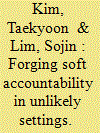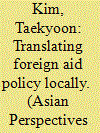| Srl | Item |
| 1 |
ID:
152743


|
|
|
|
|
| Summary/Abstract |
This study sets out to introduce the concept of soft accountability as a new approach to understanding mutual accountability in unlikely settings of development cooperation through South-South cooperation. In doing so, this study analyzes three defining components of accountability (responsibility, answerability, and enforceability) and identifies the actors and modalities of mutual accountability in four different situations of South-South cooperation mechanisms. The main finding in this conceptual analysis contains establishing an institutional and sustainable development platform for the mutual accountability of South-South cooperation by not only reflecting the distinctive nature of South-South cooperation, but also focusing on responsibility first to reduce buck-passing among actors and to sustain its continuous management.
|
|
|
|
|
|
|
|
|
|
|
|
|
|
|
|
| 2 |
ID:
110241


|
|
|
|
|
| Publication |
2012.
|
| Summary/Abstract |
This study sets out to analyze strategic relations of two major donors - the United States and China - in delivering food aid to North Korea in the 1990s. By reviewing the historical evolution of US-China strategic relations in line with food aid and adopting a game model to verify historical findings, it addresses two significant observations. First, the North Korean food aid dynamics were constructed and crystallized by donors' strategic interactions, rather than humanitarian intention to save the famine-stricken North Korea. Both donors first took into account strategic interests in aid dynamics, and then utilized food aid as a strategic instrument for their own purposes. Second, any multilateral cooperation for delivering food aid to North Korea dooms to failure, despite the potential of aid coordination among donor states. Donors' competition for the primacy in the region of Northeast Asia hampered policy coordination for institutionalizing aid networks. It is concluded that the two donors were bound to strategize food aid as a logical outgrowth of their own interests in the wake of North Korea's humanitarian disasters.
|
|
|
|
|
|
|
|
|
|
|
|
|
|
|
|
| 3 |
ID:
123028


|
|
|
|
|
| Publication |
2013.
|
| Summary/Abstract |
In this article I consider the links between foreign aid and policy transformations in aid-receiving countries, with a particular reference to the South Korean modernization process. The main analytical points concern not only how to identify foreign aid policy affecting Korea's modernization projects in the period of state building but also how to interpret the role of local partners in dealing with international aid transfers. I assert that policy transfers in the aid industry cannot be successfully completed without the consideration of policy takers' reflective translation of foreign aid in the local contexts. The Korean experience presents a proactive pattern of policy translation (reflecting local autonomy in dealing with foreign aid), rather than policy transfer (reflecting the implantation of donor-driven aid projects), by situating international policies in the local context with strong ownership and commitment. Indeed, the substantive path of policy transfers is viewed as a social construct that reflects local partners' strategic interests and development planning.
|
|
|
|
|
|
|
|
|
|
|
|
|
|
|
|